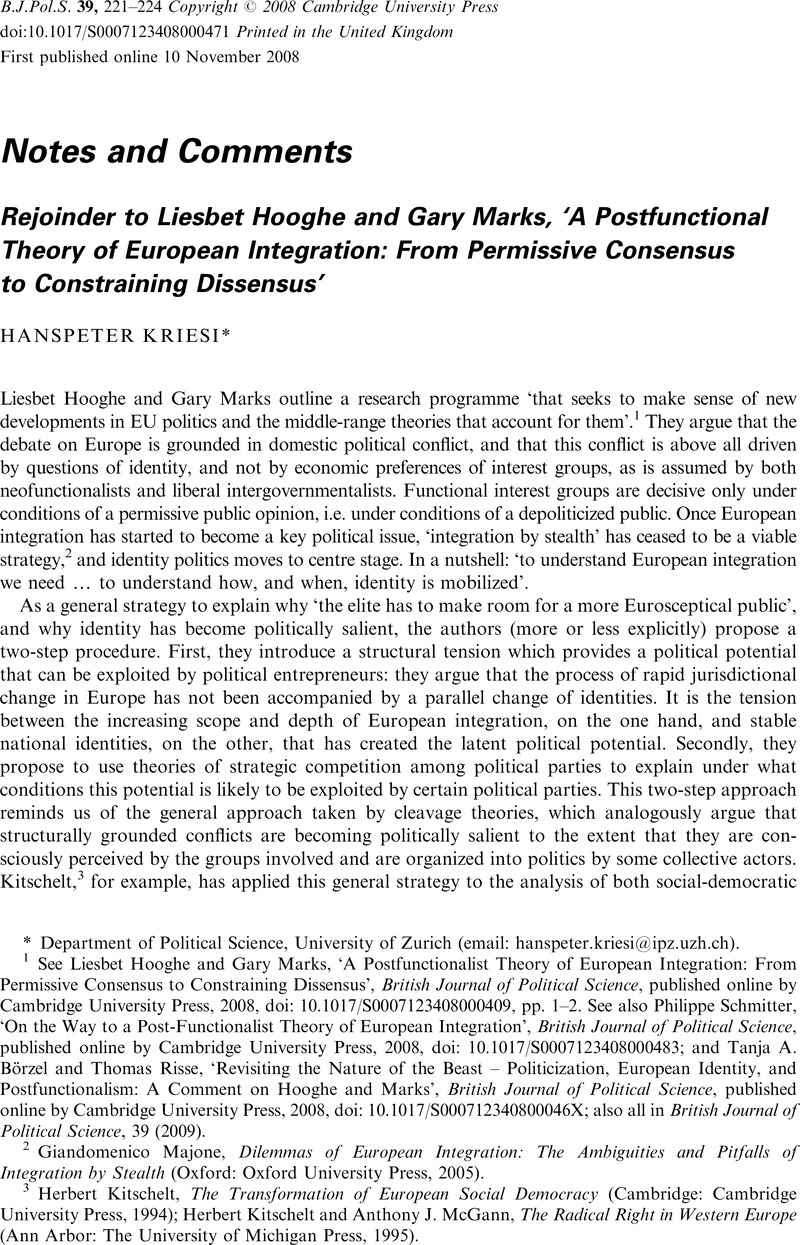Article contents
Rejoinder to Liesbet Hooghe and Gary Marks, ‘A Postfunctional Theory of European Integration: From Permissive Consensus to Constraining Dissensus’
Published online by Cambridge University Press: 01 January 2009
Abstract

- Type
- Notes and Comments
- Information
- Copyright
- Copyright © Cambridge University Press 2008
References
1 See Liesbet Hooghe and Gary Marks, ‘A Postfunctionalist Theory of European Integration: From Permissive Consensus to Constraining Dissensus’, British Journal of Political Science, published online by Cambridge University Press, 2008, doi: 10.1017/S0007123408000409, pp. 1–2. See also Philippe Schmitter, ‘On the Way to a Post-Functionalist Theory of European Integration’, British Journal of Political Science, published online by Cambridge University Press, 2008, doi: 10.1017/S0007123408000483; and Tanja A. Börzel and Thomas Risse, ‘Revisiting the Nature of the Beast – Politicization, European Identity, and Postfunctionalism: A Comment on Hooghe and Marks’, British Journal of Political Science, published online by Cambridge University Press, 2008, doi: 10.1017/S000712340800046X; also all in British Journal of Political Science, 39 (2009).
2 Giandomenico Majone, Dilemmas of European Integration: The Ambiguities and Pitfalls of Integration by Stealth (Oxford: Oxford University Press, 2005).
3 Herbert Kitschelt, The Transformation of European Social Democracy (Cambridge: Cambridge University Press, 1994); Herbert Kitschelt and Anthony J. McGann, The Radical Right in Western Europe (Ann Arbor: The University of Michigan Press, 1995).
4 Wouter van der Brug, Meindert Fennema and Jean Tillie, ‘Why Some Anti-Immigrant Parties Fail and Others Succeed: A Two-Step Model of Aggregate Electoral Support’, Comparative Political Studies, 38 (2005), 537–73.
5 Hanspeter Kriesi, Edgar Grande, Romain Lachat, Martin Dolezal, Simon Bornschier and Tim Frey, ‘Globalization and the Transformation of the National Political Space: Six European Countries Compared’, European Journal of Political Research, 45 (2006), 921–57; Hanspeter Kriesi, Edgar Grande, Romain Lachat, Martin Dolezal, Simon Bornschier and Timotheos Frey, eds, West European Politics in the Age of Globalization (Cambridge: Cambridge University Press, 2008).
6 Michael Zürn, ‘Schwarz-Rot-Grün-Braun: Reaktionsweisen auf Denationalisierung’, in Ulrich Beck, ed., Politik der Globalisierung (Frankfurt: Suhrkamp, 1998), pp. 297–330.
7 Kriesi et al., ‘Globalization and the Transformation of the National Political Space’ (2006); Kriesi et al., eds, West European Politics in the Age of Globalization.
8 Fritz W. Scharpf, Governing in Europe: Effective and Democratic? (Oxford: Oxford University Press, 1999), p. 45.
9 Romain Lachat, ‘The Electoral Consequences of the Integration vs. Demarcation Cleavage’, in Kriesi et al., eds, West European Politics in the Age of Globalization.
10 Lachat, ‘The Electoral Consequences of the Integration vs. Demarcation Cleavage’.
11 Simon Bornschier, ‘The Transformation of Historical Cleavages and the Rise of Right-Wing Populist Parties in Western Europe’ (doctoral dissertation, Department of Political Science, University of Zurich, 2007).
12 Kitschelt and McGann, The Radical Right in Western Europe.
13 Liah Greenfeld, ‘Is Nation Unavoidable? Is Nation Unavoidable Today?’ in Hanspeter Kriesi, Klaus Armingeon, Hannes Siegrist and Andreas Wimmer, eds, Nation and National Identity: The European Experience in Perspective (Chur: Rüegger, 1999), pp. 37–54, at p. 52.
14 Yael Tamir, ‘The Enigma of Nationalism’; World Politics, 47 (1995), 418–40, p. 432.
15 Cees van der Eijk and Mark Franklin, ‘Potential for Contestation on European Matters at National Elections in Europe’, in Gary Marks and Marco R. Steenbergen, eds, European Integration and Political Conflict (Cambridge: Cambridge University Press, 2004), pp. 32–50.
16 Peter Mair, ‘The Limited Impact of Europe on National Party Systems’, in Klaus H. Goetz and Simon Hix, eds, European Integration and National Political Systems (London: Frank Cass, 2001), pp. 27–51.
17 Andreas Follesdal and Simon Hix, ‘Why There is a Democratic Deficit in the EU: A Response to Majone and Moravcsik', Journal of Common Market Studies, 44, (2006), 533–62.
- 25
- Cited by


